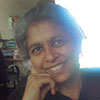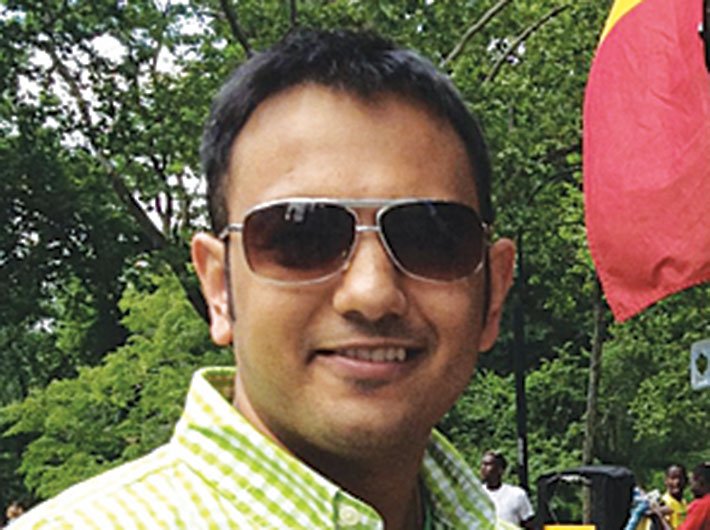A new tool is now available to detect esophageal cancer and its US-based Indian developer, Dr Maunil Bhatt, is gung-ho about putting it to use for poor Indians
A young Indian surgeon doing his senior residency in Boston University in the US has a new tool to fight cancer of the esophagus. It is a tiny stringed brush hidden in a capsule and can be swallowed.
Later it can be pulled out to check for signs of the disease in the patient.
Dr Maunil Bhatt, who went to the US after his schooling in hometown Ahmedabad, is now back. But this time, he is working towards fulfilling a dream of fighting the dangerous form of esophageal cancer among the poor in India.
He is now stationed in a clinic in Ahmedabad where he is working with Dr Sanjay Rajput, who he refers to as his mentor and guide.
Here they are screening patients for esophageal cancer using EsophaCap that he has developed. Two hundred patients will be screened in this pilot project that will run for a month. He will later carry out a multi-centre endeavour.
His work in Ahmedabad is related to the Global Surgery Research Fellowship Award he received from the Association for Academic Surgery for his project on the innovative method of screening for Esophageal Squamous Cell Cancers in rural India. He was chosen from 25 applicants and received $10,000.
Bhatt, a postgraduate resident in the department of surgery at Boston University School of Medicine and Boston Medical Center, says that his research is focused on just one type of cancer – squamous cell esophageal cancer – which is a common type Indians, especially in those from the lower socio-economic strata.
It is very deadly, he says, because it is generally detected very late in its pathogenesis.
“There are no symptoms in its initial stages and by the time patients finally develop symptoms, it is usually too late to offer them any fruitful treatment (surgery/chemotherapy),” Dr Bhatt told Governance Now.
Asked about the reliability of the screening tool, he says that his research in Gujarat will reveal its accuracy.
There is no accurate data on the incidence of this cancer in India or in his home state of Gujarat.
“The documented incidence can go as high as 12 per 1,00,000 (compared to 2-3 per 1,00,000 in western countries), which may not seem like a big number but it’s very significant when we are talking about such a severe disease. The actual incidence, however, is probably much higher than what is documented.
He is all praise for Dr Rajput, a renowned gastroenterologist in Gujarat. “My research slows down the screening process of Dr Rajput’s patients and affects his practice and yet he is supporting it purely out of his interest in promoting research,” says Dr Bhatt.
He gets referrals from a wide catchment area making it an ideal location to recruit diverse patient population, he adds.
Dr Bhatt’s sense of urgency for doing something on this cancer comes from the widespread prevalence of high risk behaviour in the young males in Gujarat. He lists beedi smoking, cigarette smoking, tobacco chewing, paan chewing, alcohol use, more than three hot drinks per day, etc. as signs of vulnerability for this kind of cancer.
It is too late to do anything once the patient develops symptoms, says Bhatt speaking from Ahmedabad. The fact there is no preventive screening mechanism in place in the country makes things worse, he adds.
It is not possible to do endoscopy on all gutka chewing people. The advantage of the new tool is that it can be administered by a wide range of people, including homoeopaths and ordinary physicians. You don’t need a specialist to do it, he says. And that brings him to the whole agenda of his life as he has planned it now.
Empowerment
As a child in Ahmedabad, he saw his grandmother die of a heart attack. “My father and uncle rushed her to three different hospitals to save her. Had the right treatment been available immediately, the family would not have had to go through so much distress and probably she would have survived the attack,” he recalls.
These experiences have driven him to want to empower doctors and even non-doctors in strategies to prevent and cure. The esophageal screening device is just a part of his larger goal. He calls himself a global surgeon. “It is a broad term and it means that I don’t want to limit my work to the US but want to train and develop the system wherever it is missing or wanting,” he explains.
Does he intend to develop an army of barefoot surgeons?
Dr Bhatt says he has two options. He can either come to India every year and do surgeries and go back. But that would lead to a void. It won’t be a continuous process. So, he would rather train doctors wherever the requirement is.
He says that he can develop systems if he can pick the right surgeons or pick the right people in a community and train them in certain procedures. “For instance, for simple surgeries like a C-section or a hernia operation, there is no need for advanced knowledge. But it can save so many people. I can find doctors who work in villages or backward areas and train them in these,” says Bhatt. But won’t they also turn into money-making machines and exploit people? He says that it depends on the people chosen.
He has already started working on his goals. The cancer project is one and the other is a project to create a trauma management system. He is already working on a pilot project in Karamsad in Gujarat and it is going to be part of a larger project for the whole country once it is done, he says.
“We are working on developing a sophisticated trauma system to improve care for critically injured patients (including pre-hospital training, in-hospital training and education, trauma registry development, etc.).”
Dr Bhatt’s life’s journey is interesting. When he was 15-year-old, his father, a professional photographer, took the call to move to the US with his wife and young son. “I continued my high school, did graduation in neurosciences and then joined medical school...for that is how it works in the US,” he says.
His mind was always made up regarding becoming a medical professional though none in the family was a doctor. It could have been the medical tragedies the family went through that egged him on, he says.
His future plan is to do a fellowship in trauma and acute care surgery. “In future, I hope to set up trauma systems, and teach surgical techniques to local surgeons in resource-poor regions to enable them to provide complex surgical care to the local population.”
He says he truly believes in the quote, “Give a man a fish and you feed him for a day, Teach a man to fish and you feed him for lifetime”. That’s his future goal, says Bhatt.
Menon is a freelance journalist
(The article appears in the April 1-15, 2017 issue of Governance Now)

